Kristine Hughes's Blog, page 105
August 2, 2013
The Pet Cemetery at Oatlands Park
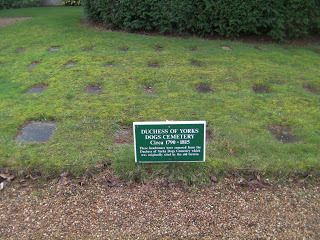
In an effort to get to the bottom of the indecipherable tablets I saw on the graves in the Duchess of York's pet cemetery at Oatland's Park, I've been going through my old notes and found a magazine article from the late 1800's that gives a fairly detailed report of the place. No wonder I thought I'd seen proper headstones on the graves - they are pictured in this same article from The Ludgate Monthly from 1897. I was not imagining things. The photo above shows what the pet cemetery looks like today. Follow this link for pictures of the original markers and the full story.
Question 1: I'd wager anything that there is not a single bone beneath any of these markers. If the graves have been moved from their original location and the headstones replaced, if in short nothing remains of the original cemetery, why go to the effort of erecting a poor facsimile of the cemetery and saying that it still exists?
Question 2: Why does this deception bother me so much?
Question 3: What's worse than finding out there's no Easter Bunny?
Published on August 02, 2013 00:00
July 31, 2013
A Pinterest Post: The Steiff Titantic Bear

Once again I'm reporting on the story behind a photo I've found on Pinterest, this time the subject is a Steiff Titanic Bear. On April 14th 1912 the passenger liner Titanic was sailing towards New York on her maiden transatlantic voyage when she struck an iceberg off the Grand Banks of Newfoundland, Canada, and sank with the loss of 1,513 lives. The whole of England was plunged into mourning and Steiff responded by producing black mohair bears to mourn the disaster. Within weeks they were displayed in shop windows throughout London and sold out very quickly. The bears' eyes were backed with red felt so that they looked as though they'd been crying. Only 1,214 black mourning bears of this type were made.
The bear above sold in 2001 at Christie's, London, for £12,925, the description read as follows: A rare Steiff black teddy bear with pronounced clipped muzzle, large black boot button eyes with red felt backing, black stitched nose, mouth and claws, swivel head, jointed elongated limbs with cream felt pads and hump --16in. (40.5cm.) high, circa 1912
On the 100th anniversary of the Titanic tragedy last year, Steiff produced three commemorative bears to mark the event.
 Othello Teddy Bear Titanic Replica wears a slightly curly black mohair coat with red discs behind his eyes. This Steiff replica is an exact copy of an original "Mourning Bear" from 1912. Only 494 of these bears were produced in 1912, and therefore, they are greatly prized today. Othello Teddy Bear Titanic Replica was produced as a Steiff Limited Edition of 1912 pieces.
Othello Teddy Bear Titanic Replica wears a slightly curly black mohair coat with red discs behind his eyes. This Steiff replica is an exact copy of an original "Mourning Bear" from 1912. Only 494 of these bears were produced in 1912, and therefore, they are greatly prized today. Othello Teddy Bear Titanic Replica was produced as a Steiff Limited Edition of 1912 pieces.
 Polar the Titanic Bear is made of snow white alpaca and wears a whimsical sailor suit. The original bear was almost lost at sea during his owner's rescue from the Titanic, but was rescued by a sailor and returned to the little boy who owned him. Polar the Titanic Bear was a Steiff Limited Edition of 1500 pieces. Further background on this particular bear was found on the Bearly A Memory website: Daisy Spedden and her husband Frederick were a wealthy couple with a passion for travel. In early 1912, the Spedden family sailed from New York to Algiers and then on to the French Riviera. Returning through Paris, the family boarded the train for Cherbourg; there they took a small boat out to the huge Titanic. On the night of the disaster, Polar, a beloved Steiff bear purchased at FAO Schwarz, was tucked under his master's arm as the Speddens were lowered down the side of the Titanic into a lifeboat. After the sinking, the survivors were swung up the side of the rescue ship. But Polar found himself forgotten in the empty lifeboat… until a sailor rescued him and returned him to his joyous master, Douglas. Steiff brings this true story to life with “Polar, The Titanic Bear”, a magnificent interpretation of the original bear. Polar is made of snow white genuine mohair and wears a detailed sailor suit. He's every bit as charming as the original, which survived the tragedy 100 years ago, based on the popular book. The story is continued on a website called Enchanted Titanic:There was also a young boy travelling with his family on the Titanic. His name was Douglas Spedden. He had been given a Steiff Polar Bear a year earlier and had carried it with him throughout his travels with his parents. When the Titanic went down, he and his family went into lifeboat #3 and were picked up by the Carpathia and were returned to New York where they lived. In 1913, his mother wrote a book about the bears travels and adventures. It was called “My Story” and was told through the eyes of his beloved Polar Bear. On August 6th, 1915, Douglas Spedden was struck and killed by a car at his summer home in Maine. This was one of the first recorded car fatalities in the state. The book was put away in a trunk and was not discovered until 1982. In November of 1994, the book entitled
Polar, the Titanic Bear
was published and released.
Polar the Titanic Bear is made of snow white alpaca and wears a whimsical sailor suit. The original bear was almost lost at sea during his owner's rescue from the Titanic, but was rescued by a sailor and returned to the little boy who owned him. Polar the Titanic Bear was a Steiff Limited Edition of 1500 pieces. Further background on this particular bear was found on the Bearly A Memory website: Daisy Spedden and her husband Frederick were a wealthy couple with a passion for travel. In early 1912, the Spedden family sailed from New York to Algiers and then on to the French Riviera. Returning through Paris, the family boarded the train for Cherbourg; there they took a small boat out to the huge Titanic. On the night of the disaster, Polar, a beloved Steiff bear purchased at FAO Schwarz, was tucked under his master's arm as the Speddens were lowered down the side of the Titanic into a lifeboat. After the sinking, the survivors were swung up the side of the rescue ship. But Polar found himself forgotten in the empty lifeboat… until a sailor rescued him and returned him to his joyous master, Douglas. Steiff brings this true story to life with “Polar, The Titanic Bear”, a magnificent interpretation of the original bear. Polar is made of snow white genuine mohair and wears a detailed sailor suit. He's every bit as charming as the original, which survived the tragedy 100 years ago, based on the popular book. The story is continued on a website called Enchanted Titanic:There was also a young boy travelling with his family on the Titanic. His name was Douglas Spedden. He had been given a Steiff Polar Bear a year earlier and had carried it with him throughout his travels with his parents. When the Titanic went down, he and his family went into lifeboat #3 and were picked up by the Carpathia and were returned to New York where they lived. In 1913, his mother wrote a book about the bears travels and adventures. It was called “My Story” and was told through the eyes of his beloved Polar Bear. On August 6th, 1915, Douglas Spedden was struck and killed by a car at his summer home in Maine. This was one of the first recorded car fatalities in the state. The book was put away in a trunk and was not discovered until 1982. In November of 1994, the book entitled
Polar, the Titanic Bear
was published and released. Centenary Titanic Ted is a replica of the original "Mourning Bear" reintroduced exclusively for both the US and UK markets by Steiff. This incredible teddy bear has red discs behind his show button eyes (just like the original) to represent tear-stained eyes. This Titanic Commemorative bear is from a limited edition of 1912 pieces.
Centenary Titanic Ted is a replica of the original "Mourning Bear" reintroduced exclusively for both the US and UK markets by Steiff. This incredible teddy bear has red discs behind his show button eyes (just like the original) to represent tear-stained eyes. This Titanic Commemorative bear is from a limited edition of 1912 pieces.
Published on July 31, 2013 00:00
July 29, 2013
A Couple In England - Day 9
Next day, we met Hester in the car park. When I introduced her to Hubby, all she said was, "Oh dear."
I opened the rear door of Hester's car and Hubby dropped onto the back seat. We pulled out of the car park and were soon on our way to Oatlands Park, home of Frederica, Duchess of York, or Freddy, as she's affectionately known by my circle of friends.
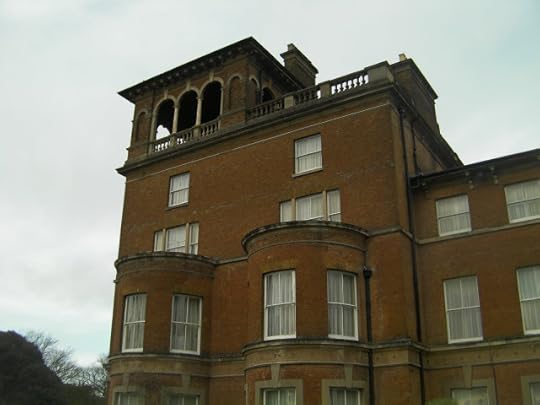
I've been wanting to see Oatlands Park, Freddy's home, for ages and so I was thrilled when Hester agreed to accompany there. Today, Oatlands is a hotel that stands on the footprint of a large mansion which burned down in the late 1700s, but had dated back to the 15th Century. A Parliamentary Survey of the period mentions a house which sat in the grounds of a great royal palace, on the Oatlands Estate. Henry VIII erected the palace for his new Queen, Anne of Cleves. Although a worthy rival to his other riverside house at Hampton Court, the imposing red brick building with its gateways, octagonal towers and open courts, Oatlands was only visited occasionally by the King. And the intended resident, Anne, probably never lived there during the short time she was his wife, but it is thought Henry secretly married his next Queen, Anne’s young Lady-in-Waiting, Catherine Howard, in the Palace chapel.
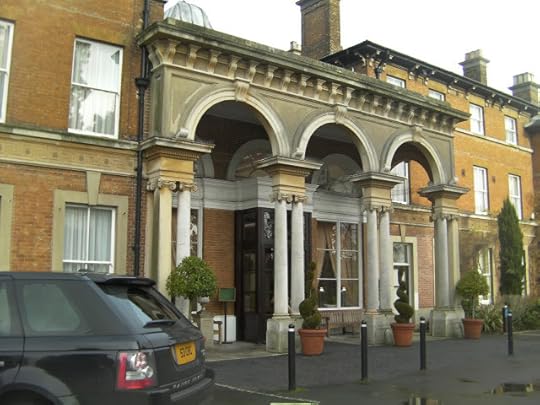
Over the next 150 years, the house and grounds were remodelled by a string of wealthy tenants. You can still see the coat of arms of one, the Duke of Newcastle, on the main gates at the entrance to the Hotel.
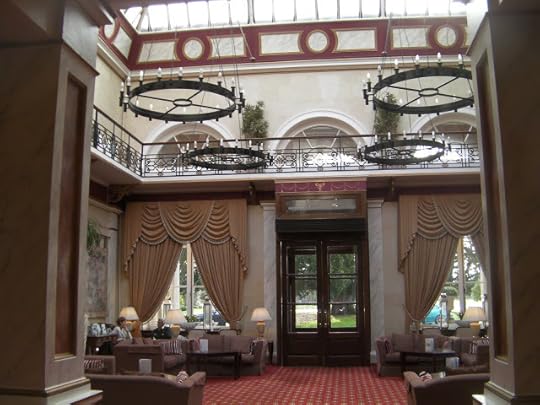
Upon entering the building, we found ourselves in a bright and airy lounge and settled ourselves upon the sofas, where we ordered coffees.
"Well, Kristine, you're finally at Oatlands," said Hester.
"And soon we'll be at the famous cemetery," I said.
"There's a cemetery here?" asked Hubby.
"A pet cemetery. Freddy loved pets of every description and created a cemetery where she buried them all. She was eccentric, but popular with the Regency set."
"Didn't Princess Charlotte honeymoon here," asked Hester.
"Yes, and Prince Leopold stayed here after Charlotte's death. And of course Brummell was a frequent visitor."
"Ah, Brummell and the decoupage screen that was never finished," sighed Hester.
"So sad," I agreed.
"The what screen?" asked Hubby.
"Decoupage," Hester and I replied in unison. Hubby declined to pursue the matter further.
The diarist Charles Greville has left us a picture of his visits to Oatlands in his Memoirs. Here is an extract:
"The week end parties were often large, and one of the principal amusements of the guests was to sit up playing whist till four o'clock in the morning. On Sundays," he continues, " we amused ourselves with eating fruit in the garden, and shooting at a mark with pistols, and playing with the monkeys. I bathed in the cold bath in the grotto, which is as clear as crystal and as cold as ice. Oatlands is the worst managed establishment in England: there are a great many servants, and nobody waits on you; a vast number of horses, and none to ride or drive."
"The Duchess seldom goes to bed, or, if she does, only for an hour or two; she sleeps dressed upon a couch, sometimes in one room, sometimes in another. She frequently walks out very late at nights, or rather early in the morning, and she always sleeps with open windows. She dresses and breakfasts at three o'clock, afterwards walks out with all her dogs, and seldom appears before dinner-time. At night, when she cannot sleep, she has women to read to her. The Duchess of York is clever and well informed; she likes society, and dislikes all form and ceremony; but in the midst of the most familiar intercourse she always preserves a certain dignity of manner. Those who are in the habit of going to Oatlands are perfectly at their ease with her, and talk with as much freedom as they would to any other woman, but always with great respect. Her mind is not perhaps the most delicate; she shows no dislike to coarseness of sentiment or language, and I have often seen her very much amused with jokes, stories, and allusions which would shock a very nice person. But her own conversation is never polluted with anything the least indelicate or unbecoming. She is very sensible to little attentions, and is annoyed if anybody appears to keep aloof from her or to shun conversing with her. Her dogs are her greatest interest and amusement, and she has at least forty of various kinds. She is delighted when anybody gives her a dog, or a monkey, or a parrot, of all of which she has vast numbers; it is impossible to offend or annoy her more than by ill using any of her dogs, and if she were to see anybody beat or kick any one of them she would never forgive it."
The room in which the three of us sat sipping our coffee would be unrecognizable to Freddy. After the house burnt down in 1794, it was rebuilt in the Gothic style by her husband, the Duke of York, who went on to acquire the Estate Freehold. Freddy died in 1820 and when the Duke died in 1827, the property was sold to a young Regency dandy and gambler called Edward Hughes Ball Hughes, who was popularly known as ‘The Golden Ball.’ He spent his honeymoon at Oatlands, before pulling down large parts of the existing building and making many alterations to what was left.
"Ready to find the cemetery?" Hester asked.
"Yes. I can't wait to read the little head stones. Freddy had their names put on the stones and dates and often noted what sort of animal they were."
Originally, the cemetery was located near the old Grotto, where Greville bathed and where George IV held a dinner in celebration of Wellington's victory at Waterloo. The stones were moved closer to the house at some point and so were relatively easy to find as they are located right beside a gravel path.
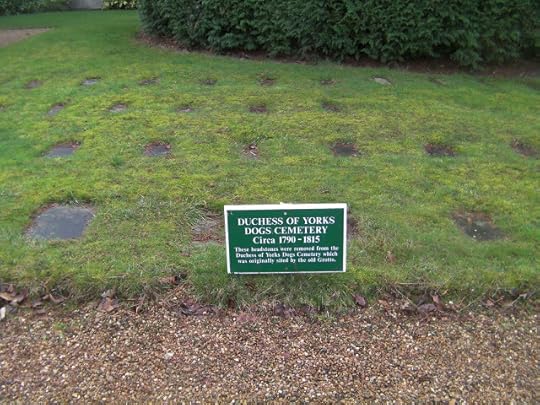
I was a bit taken aback at first glance, as I had thought that the grave markers would look more like traditional head stones. Hester and I drew closer until we were standing over the stones.
"Oh dear," Hester said. Age and weather had worked ill upon the stones, which were now all completely smooth - whatever had once been written upon them had been forever erased.
"I wanted to read them," I lamented.
"I know. Me, too," said Hester, whose face showed sympathy for my disappointment. "But look, we can still walk where Freddy and Brummell walked. That's something, what?"
I smiled at her. "It's something, indeed," I said. "And something wonderful at that."
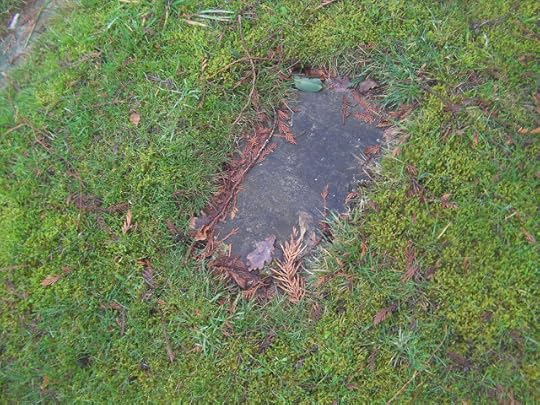
So off the three of us strolled, down the gravel paths and over to the ornamental lake.
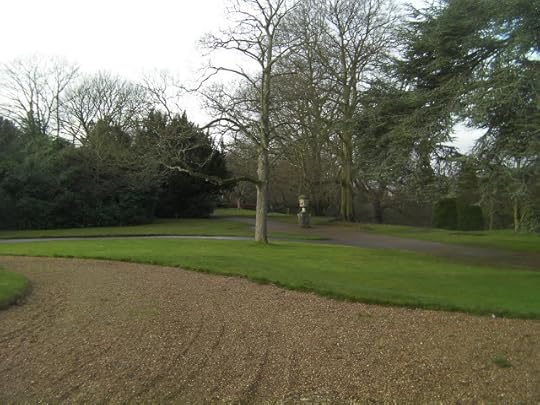


Surprise! Finally, a picture of me and Hubby!
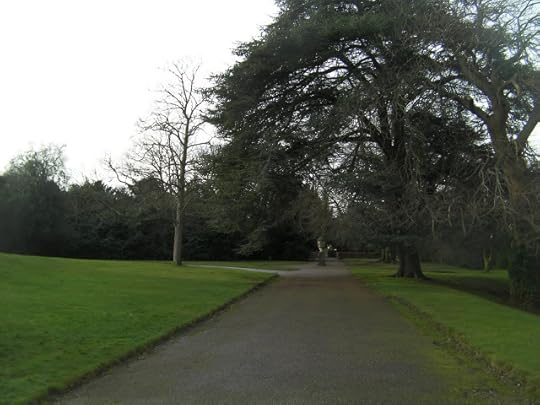
On our way back to the Hotel, Hester pointed out the cedar trees on the property. "Edward Lear used these trees as models for his painting The Cedars of Lebanon."
In her biography of Lear called The Life of a Wanderer, Vivien Noakes wrote "He needed some cedar trees that were within easy reach of London, and he found them at the Oatlands Park Hotel at Walton-on-Thames. Whilst he was working on his nine foot long picture of the ‘Cedars of the Lebanon’, he penned letters to his friends including Emily Tennyson, Sir George Grove and Chichester Fortescue, to whom he wrote in 1860 saying "The Hotel then is a large and sumptuously commodious place... I have a large light bedroom and wanting for naught."

Edward Lear's The Cedars of Lebanon

Taking a long, last look at Oatlands, we made for the car park and set off on the second part of today's journey - Hampton Court Palace.
Part Two Coming Soon!
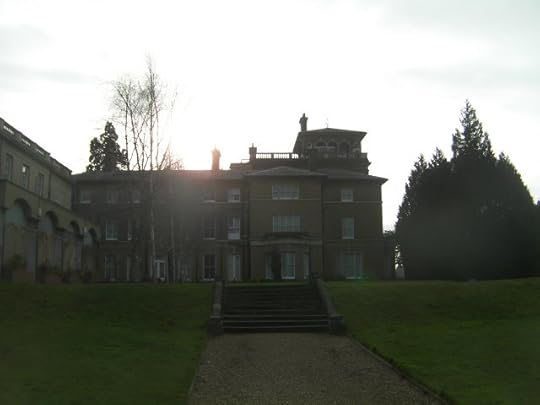
Published on July 29, 2013 00:00
July 26, 2013
Happy Birthday to Dame Helen Mirren
By Guest Blogger Spencer Blohm
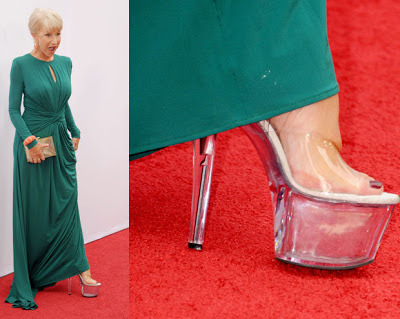
The incomparable Dame Helen Mirren is turning 68 years old today, but you wouldn’t know it from her spunky attitude or unique fashion choices - she was spotted in clear platform heels at the Red 2 premiere in Hollywood a few weeks ago on July 11. She has portrayed the Queen of England, Alfred Hitchcock’s wife, and Linda Kenney Baden, but her roles don’t just include famously imposing females - Mirren played Prospero (changed to Prospera) in Shakespeare’s epic screen adaptation of The Tempest, just to cite one unexpected example. The following year, Mirren also appeared as Hobson in the 2011 remake of the 1981 comedy Arthur- coincidentally, both roles were previously played by British actor Sir John Gielgud, certainly a far cry from Mirren in terms of, well, everything.
At 68, Dame Mirren is basically a one-woman powerhouse. She has won an Academy Award, 3 Golden Globes, 4 Emmy’s, and 4 SAG Awards, just to name the most recognizable of her many trophies, and she continues to dazzle both on and off screen. Like many of her fellow British actors, Mirren worked with the Royal Shakespeare Company throughout the late 1960s, made her West End stage debut in the 1970s and recently returned again to the stage, portraying Queen Elizabeth II for the second time in her career in the play The Audience. Earlier this year, in January, Mirren was awarded her very own star on the Hollywood Walk of Fame, a well-deserved honor for an actress rapidly becoming something of an icon.

In November of this year, the long-running British sci-fi show Doctor Whowill be celebrating its 50th anniversary, and just a month later, the show says goodbye to the eleventh regeneration of the Doctor when Matt Smith leaves the role. Smith’s announcement has opened up the door to speculation and predictions about possible actors to play the twelfth incarnation of Dr. Who, and Mirren’s name has repeatedly come up among fans, amongst whom the cry for there to finally be a female Doctor has grown louder and louder. Dame Helen Mirren herself has said publicly that she believes it is time for a female Doctor - but not her. So far, she has stuck with her assertion that she would never even contemplate the role, but since Mirren has successfully portrayed previously male characters before, and because her presence might bring a new audience to the cult show that Dr. Who has always been, it has to be said that if anyone could be the first female Doctor it would be Dame Helen Mirren.
Despite her 68 years, Dame Helen Mirren continues to work both in front of the camera and on stage, and it doesn’t look like she plans on retiring from acting in the next few years or any time soon. The bold actress continues to entertain us with her art as well as her fiery, unapologetically honest and fun personality, and we hope she doesn’t go anywhere for a long, long time.
Author Bio: Spencer Blohm is a freelance film, entertainment, and culture blogger for DirectTVcomparison.com. When he’s not working he can usually be found in bed watching movies with his less than enthusiastic cat. He lives and works in Chicago, despite the winters.

The incomparable Dame Helen Mirren is turning 68 years old today, but you wouldn’t know it from her spunky attitude or unique fashion choices - she was spotted in clear platform heels at the Red 2 premiere in Hollywood a few weeks ago on July 11. She has portrayed the Queen of England, Alfred Hitchcock’s wife, and Linda Kenney Baden, but her roles don’t just include famously imposing females - Mirren played Prospero (changed to Prospera) in Shakespeare’s epic screen adaptation of The Tempest, just to cite one unexpected example. The following year, Mirren also appeared as Hobson in the 2011 remake of the 1981 comedy Arthur- coincidentally, both roles were previously played by British actor Sir John Gielgud, certainly a far cry from Mirren in terms of, well, everything.
At 68, Dame Mirren is basically a one-woman powerhouse. She has won an Academy Award, 3 Golden Globes, 4 Emmy’s, and 4 SAG Awards, just to name the most recognizable of her many trophies, and she continues to dazzle both on and off screen. Like many of her fellow British actors, Mirren worked with the Royal Shakespeare Company throughout the late 1960s, made her West End stage debut in the 1970s and recently returned again to the stage, portraying Queen Elizabeth II for the second time in her career in the play The Audience. Earlier this year, in January, Mirren was awarded her very own star on the Hollywood Walk of Fame, a well-deserved honor for an actress rapidly becoming something of an icon.

In November of this year, the long-running British sci-fi show Doctor Whowill be celebrating its 50th anniversary, and just a month later, the show says goodbye to the eleventh regeneration of the Doctor when Matt Smith leaves the role. Smith’s announcement has opened up the door to speculation and predictions about possible actors to play the twelfth incarnation of Dr. Who, and Mirren’s name has repeatedly come up among fans, amongst whom the cry for there to finally be a female Doctor has grown louder and louder. Dame Helen Mirren herself has said publicly that she believes it is time for a female Doctor - but not her. So far, she has stuck with her assertion that she would never even contemplate the role, but since Mirren has successfully portrayed previously male characters before, and because her presence might bring a new audience to the cult show that Dr. Who has always been, it has to be said that if anyone could be the first female Doctor it would be Dame Helen Mirren.
Despite her 68 years, Dame Helen Mirren continues to work both in front of the camera and on stage, and it doesn’t look like she plans on retiring from acting in the next few years or any time soon. The bold actress continues to entertain us with her art as well as her fiery, unapologetically honest and fun personality, and we hope she doesn’t go anywhere for a long, long time.

Author Bio: Spencer Blohm is a freelance film, entertainment, and culture blogger for DirectTVcomparison.com. When he’s not working he can usually be found in bed watching movies with his less than enthusiastic cat. He lives and works in Chicago, despite the winters.
Published on July 26, 2013 00:00
July 24, 2013
The Adventures of Dr. Syntax in Search of the Picturesque, Part Eleven
Part Eleven includes excerpts from Cantos XXI, XXII, XXIII
We left Dr. Syntax nearly at the end of his Adventures...
Selections from Canto 21:
Dr. Syntax is about to set out for the day when his horse Grizzle is brought around and he is delighted to find his mare’s lack of ears and tail have been “replaced.”
Of painted canvass were her ears; Upon her stump a tail appears; So chang'd she was, so gay, so smart, Deck'd out with so much curious art, That even Syntax hardly dare To claim his metamorphos'd mare. He said no more — but kenn'd the joke Was not the sport of vulgar folk; So trotted off—-and kindly lent His smile to aid the merriment. ...
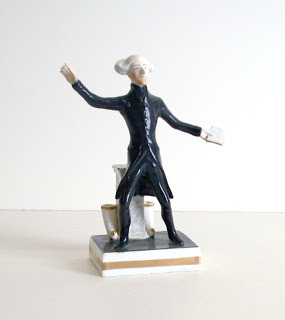 Dr. Syntax Preaching, c. 1790, Art Institute of ChicagoDerby Porcelain Manufactory, soft-paste porcelain with polychrome enamel decoration
Dr. Syntax Preaching, c. 1790, Art Institute of ChicagoDerby Porcelain Manufactory, soft-paste porcelain with polychrome enamel decoration
He soon decides to stop and attend church…
To the first church I will repair. And pay my solemn duties there.Thus as he spoke, a village chime Denoted it was service time: And soon a ruddy Curate came, To whom he gravely told his name, His rank and literary fame; And said, as he'd been us'd to teaching, He'd give him half an hour's preaching. This was accepted with a smile. And they both strutted up the aisle;When, in due time, and with due grace, Syntax display'd his preaching face. And in grave tones, though somewhat hoarse,He gave the following discourse…
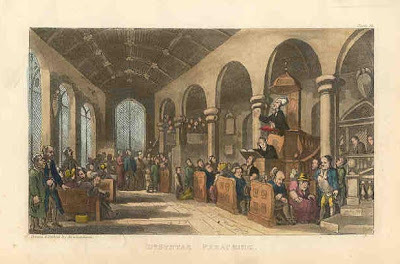 Syntax preaching Dr. Syntax preaches on for several hundred rhyming lines and concludes:
Syntax preaching Dr. Syntax preaches on for several hundred rhyming lines and concludes:
“Glory's eternal crown to share.
Which Cherubs sing, and Angels wear: Then is complete th' amazing plan. And Mortal is Immortal Man." Here Syntax thought it fit to close;- Th' admiring congregation rose; And after certain hems and ha's, The 'Squire nodded his applause; Nay, such attention he had given To the sage Minister of Heaven, That neither did he sleep nor snore — A wonder never known before. Then quickly issuing from his pew. He came to thank the Doctor too. “Sir, your discourse, so good and fine, Proves you to be a great divine, While I, alas! am but a sinner; So you'll go home with me to dinner.
Dr. Syntax has a good dinner, is invited to spend the night.
Selections from Canto 22
The next morning, Dr. Syntax and Grizzle head off toward home, and stop for a rest, But now a trumpet's warlike sound
'Woke Syntax from his dream profound; While Grizzle frisk'd, and mov'd on straight, With many a prancing, to the gate, Where, in a gorgeous cap of fur. Stood the proclaiming Trumpeter , With face as the old Lion red, Which dangling hung above his head. "Oh!" he exclaim'd, "I now could swear I see again the Grizzle mare; I know her well by that same scar Which she got with me in the war…
Now Syntax sat and heard the story The soldier told of England's glory; How British columns fought their way, And drove the foe, and won the day: How oft he did his breath enlarge. To call to arms and sound the charge; But, though he rous'd to many a feat, He never sounded a retreat. Still he declaim’d in modest tone, For England's glory was his own. …
It has just come into my mind To leave poor Grizzle here behind.And let some stage or mail convey My bags and me my onward way. Perhaps, for old-acquaintance sake, Of my poor beast the care you'll take." "If so," the Trumpeter replied, "'Twill be my honour and my pride. God bless your Rev'rence, — never fear —Your mare shall have protection here ; When you return, her looks will tell. That her old friend has us'd her well."
A horn now told the near approach Of some convenient, rapid coach; And soon a vehicle and four Appear'd at the Red Lion door; Into his place the Doctor pounc'd; The coachman smack'd, and off they bounc'd. … After a rather uncomfortable trip, Dr. Syntax arrives in London and wonders where to stay. He was resolved to try his fate In knocking at his Lordship's gate.At that same gate he soon appear'd; My Lord with smiles the Doctor cheer'd. "You have done well, my learned friend. Hither your early steps to bend; Bus'ness has brought me up to town, And thus you find me all alone: Here pitch your tent and pass your hour In working up your pleasant Tour; And, when 'tis done, I'll aid your scheme —It shall not prove an idle dream." Syntax receiv'd his Lordship's grace With moisten'd eye, but smiling face, And for ten days, at morn and night, He toil'd to bring his book to light… My Lord, by gen'rous friendship mov'd, Now read his Volume, and approv'd, "Think not," said he, "I fondly give Opinions, tending to deceive: That I'm sincere, my friend, you'll see. When I declare that you are free To dedicate your Book to me; Nor is this all — I'll recommend My very pleasant, learned friend To one who has as lib'ral feeling As any in this kind of dealing; And when my letter you present,Hell take the work, and give content. Thus, my good Sir, I've done my best: You'll see him and explain the rest." …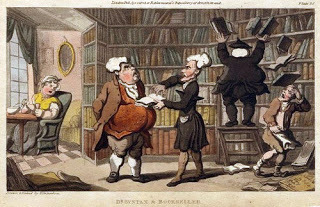 Dr. Syntax heads to Paternoster Row, site of the bookseller’s office. Eventually he meets the man: "My errand was to bid you look With care and candour on this Book; And tell me whether you think fit To buy, or print, or publish it? The subject which the work contains Is Art and Nature's fair domains; 'Tis form'd the curious to allure; — In short, good man, it is a Tour; With drawings all from nature made. And with no common skill displayed;:Each house, each place, each lake, each tree, These fingers drew — these eyes did see." Though at first unwilling, a letter from Syntax’s mentor changes the bookseller’s mind: “His Lordship here expressly says Your work transcends his utmost praise; Desires the printing may commence, And he'll be bound for the expense. The book will sell, I have no doubt, I'll spare no pains to bring it out: A work like this must not be stinted. Two thousand copies shall be printed.” …Thus (such are this world's odds and ends) Though foes they met — they parted friends.
Dr. Syntax heads to Paternoster Row, site of the bookseller’s office. Eventually he meets the man: "My errand was to bid you look With care and candour on this Book; And tell me whether you think fit To buy, or print, or publish it? The subject which the work contains Is Art and Nature's fair domains; 'Tis form'd the curious to allure; — In short, good man, it is a Tour; With drawings all from nature made. And with no common skill displayed;:Each house, each place, each lake, each tree, These fingers drew — these eyes did see." Though at first unwilling, a letter from Syntax’s mentor changes the bookseller’s mind: “His Lordship here expressly says Your work transcends his utmost praise; Desires the printing may commence, And he'll be bound for the expense. The book will sell, I have no doubt, I'll spare no pains to bring it out: A work like this must not be stinted. Two thousand copies shall be printed.” …Thus (such are this world's odds and ends) Though foes they met — they parted friends.
Selections from Canto 23
…His little journey at an end.
The Doctor join'd his noble friend: Together they in comfort dine. Then munch'd their cakes, and sipp'd their wine When Syntax, briefly, thus display'd His parley with the man of trade. "I owe unto your Lordship's name My future gains in gold and fame. …
Syntax"To your kind words I've nought to say, But thank your Lordship, and obey. And now, as twenty years have pass'd Since I beheld fair London last, I shall employ the present day In strolling calmly to survey What changes time and chance have made,What wealth has done, and art essay'd. What taste has, in its fancies, shown. To give new splendour to the town; That being done, I’11 take my way To Covent Garden — to the play."
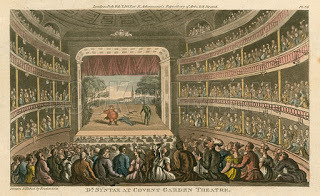 Dr. Syntax at Covent Garden Theatre
Dr. Syntax at Covent Garden Theatre
…(Syntax) hasten'd to the playhouse door, And took his place within the pit, Beside a critic and a wit. As wits and critics now are known, Who hash up nonsense for the town; And in the daily colunms show How small the sum of all they know. …
… as they the drama view'd, The conversation was renew'd. And lasted till the whole was o'er; When, as they pass'd the playhouse door. The Critic said, — "'Twill wound my heart If you and I so soon must part: Oh, how I long to crack a bottle With such a friend of Aristotle! “…
When fairly got into the street, "Oh," thought the Doctor, "what a treat For my good Lord, when next we meet!"
End canto 23
Final Excerpts to come soon!
We left Dr. Syntax nearly at the end of his Adventures...
Selections from Canto 21:
Dr. Syntax is about to set out for the day when his horse Grizzle is brought around and he is delighted to find his mare’s lack of ears and tail have been “replaced.”
Of painted canvass were her ears; Upon her stump a tail appears; So chang'd she was, so gay, so smart, Deck'd out with so much curious art, That even Syntax hardly dare To claim his metamorphos'd mare. He said no more — but kenn'd the joke Was not the sport of vulgar folk; So trotted off—-and kindly lent His smile to aid the merriment. ...
 Dr. Syntax Preaching, c. 1790, Art Institute of ChicagoDerby Porcelain Manufactory, soft-paste porcelain with polychrome enamel decoration
Dr. Syntax Preaching, c. 1790, Art Institute of ChicagoDerby Porcelain Manufactory, soft-paste porcelain with polychrome enamel decoration He soon decides to stop and attend church…
To the first church I will repair. And pay my solemn duties there.Thus as he spoke, a village chime Denoted it was service time: And soon a ruddy Curate came, To whom he gravely told his name, His rank and literary fame; And said, as he'd been us'd to teaching, He'd give him half an hour's preaching. This was accepted with a smile. And they both strutted up the aisle;When, in due time, and with due grace, Syntax display'd his preaching face. And in grave tones, though somewhat hoarse,He gave the following discourse…
 Syntax preaching Dr. Syntax preaches on for several hundred rhyming lines and concludes:
Syntax preaching Dr. Syntax preaches on for several hundred rhyming lines and concludes:“Glory's eternal crown to share.
Which Cherubs sing, and Angels wear: Then is complete th' amazing plan. And Mortal is Immortal Man." Here Syntax thought it fit to close;- Th' admiring congregation rose; And after certain hems and ha's, The 'Squire nodded his applause; Nay, such attention he had given To the sage Minister of Heaven, That neither did he sleep nor snore — A wonder never known before. Then quickly issuing from his pew. He came to thank the Doctor too. “Sir, your discourse, so good and fine, Proves you to be a great divine, While I, alas! am but a sinner; So you'll go home with me to dinner.
Dr. Syntax has a good dinner, is invited to spend the night.
Selections from Canto 22
The next morning, Dr. Syntax and Grizzle head off toward home, and stop for a rest, But now a trumpet's warlike sound
'Woke Syntax from his dream profound; While Grizzle frisk'd, and mov'd on straight, With many a prancing, to the gate, Where, in a gorgeous cap of fur. Stood the proclaiming Trumpeter , With face as the old Lion red, Which dangling hung above his head. "Oh!" he exclaim'd, "I now could swear I see again the Grizzle mare; I know her well by that same scar Which she got with me in the war…
Now Syntax sat and heard the story The soldier told of England's glory; How British columns fought their way, And drove the foe, and won the day: How oft he did his breath enlarge. To call to arms and sound the charge; But, though he rous'd to many a feat, He never sounded a retreat. Still he declaim’d in modest tone, For England's glory was his own. …
It has just come into my mind To leave poor Grizzle here behind.And let some stage or mail convey My bags and me my onward way. Perhaps, for old-acquaintance sake, Of my poor beast the care you'll take." "If so," the Trumpeter replied, "'Twill be my honour and my pride. God bless your Rev'rence, — never fear —Your mare shall have protection here ; When you return, her looks will tell. That her old friend has us'd her well."
A horn now told the near approach Of some convenient, rapid coach; And soon a vehicle and four Appear'd at the Red Lion door; Into his place the Doctor pounc'd; The coachman smack'd, and off they bounc'd. … After a rather uncomfortable trip, Dr. Syntax arrives in London and wonders where to stay. He was resolved to try his fate In knocking at his Lordship's gate.At that same gate he soon appear'd; My Lord with smiles the Doctor cheer'd. "You have done well, my learned friend. Hither your early steps to bend; Bus'ness has brought me up to town, And thus you find me all alone: Here pitch your tent and pass your hour In working up your pleasant Tour; And, when 'tis done, I'll aid your scheme —It shall not prove an idle dream." Syntax receiv'd his Lordship's grace With moisten'd eye, but smiling face, And for ten days, at morn and night, He toil'd to bring his book to light… My Lord, by gen'rous friendship mov'd, Now read his Volume, and approv'd, "Think not," said he, "I fondly give Opinions, tending to deceive: That I'm sincere, my friend, you'll see. When I declare that you are free To dedicate your Book to me; Nor is this all — I'll recommend My very pleasant, learned friend To one who has as lib'ral feeling As any in this kind of dealing; And when my letter you present,Hell take the work, and give content. Thus, my good Sir, I've done my best: You'll see him and explain the rest." …
 Dr. Syntax heads to Paternoster Row, site of the bookseller’s office. Eventually he meets the man: "My errand was to bid you look With care and candour on this Book; And tell me whether you think fit To buy, or print, or publish it? The subject which the work contains Is Art and Nature's fair domains; 'Tis form'd the curious to allure; — In short, good man, it is a Tour; With drawings all from nature made. And with no common skill displayed;:Each house, each place, each lake, each tree, These fingers drew — these eyes did see." Though at first unwilling, a letter from Syntax’s mentor changes the bookseller’s mind: “His Lordship here expressly says Your work transcends his utmost praise; Desires the printing may commence, And he'll be bound for the expense. The book will sell, I have no doubt, I'll spare no pains to bring it out: A work like this must not be stinted. Two thousand copies shall be printed.” …Thus (such are this world's odds and ends) Though foes they met — they parted friends.
Dr. Syntax heads to Paternoster Row, site of the bookseller’s office. Eventually he meets the man: "My errand was to bid you look With care and candour on this Book; And tell me whether you think fit To buy, or print, or publish it? The subject which the work contains Is Art and Nature's fair domains; 'Tis form'd the curious to allure; — In short, good man, it is a Tour; With drawings all from nature made. And with no common skill displayed;:Each house, each place, each lake, each tree, These fingers drew — these eyes did see." Though at first unwilling, a letter from Syntax’s mentor changes the bookseller’s mind: “His Lordship here expressly says Your work transcends his utmost praise; Desires the printing may commence, And he'll be bound for the expense. The book will sell, I have no doubt, I'll spare no pains to bring it out: A work like this must not be stinted. Two thousand copies shall be printed.” …Thus (such are this world's odds and ends) Though foes they met — they parted friends. Selections from Canto 23
…His little journey at an end.
The Doctor join'd his noble friend: Together they in comfort dine. Then munch'd their cakes, and sipp'd their wine When Syntax, briefly, thus display'd His parley with the man of trade. "I owe unto your Lordship's name My future gains in gold and fame. …
Syntax"To your kind words I've nought to say, But thank your Lordship, and obey. And now, as twenty years have pass'd Since I beheld fair London last, I shall employ the present day In strolling calmly to survey What changes time and chance have made,What wealth has done, and art essay'd. What taste has, in its fancies, shown. To give new splendour to the town; That being done, I’11 take my way To Covent Garden — to the play."
 Dr. Syntax at Covent Garden Theatre
Dr. Syntax at Covent Garden Theatre …(Syntax) hasten'd to the playhouse door, And took his place within the pit, Beside a critic and a wit. As wits and critics now are known, Who hash up nonsense for the town; And in the daily colunms show How small the sum of all they know. …
… as they the drama view'd, The conversation was renew'd. And lasted till the whole was o'er; When, as they pass'd the playhouse door. The Critic said, — "'Twill wound my heart If you and I so soon must part: Oh, how I long to crack a bottle With such a friend of Aristotle! “…
When fairly got into the street, "Oh," thought the Doctor, "what a treat For my good Lord, when next we meet!"
End canto 23
Final Excerpts to come soon!
Published on July 24, 2013 00:00
July 23, 2013
Royal Baby On Board!
Published on July 23, 2013 16:02
Wishing the Future King Health, Happiness and a Long Life
Published on July 23, 2013 11:41
July 22, 2013
Breathlessly Home from England
You were, perhaps, thinking you'd read today about Kristine's trip to Oatlands, home of Frederica, Duchess of York. But there will be a wee postponement before you hear about her visit with Hester Davenport (and the almost-healthy Hubby). Now, don't panic, the cholera has not recurred, but Kristine is taking a bit of a break to celebrate a family birthday.
So, Victoria here, breathlessly just back from England (and the Czech Republic and Germany) with her very own long-suffering hubby. Here he is enjoying the treasures of the Fitzwilliam Museum in Cambridge.
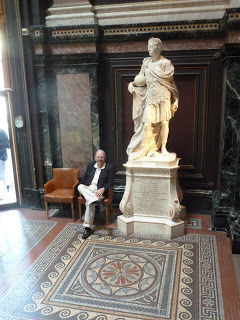
We did not have anything like the trials and tribulations of Kristine and Greg last winter -- not even a moment of stomach upset. HOWEVER...our feet took a beating, and Ed was almost hobbling by the end of the three weeks-plus we were in Europe. Blisters.
I will report in detail later, after I've rested up, and Kristine has completed her saga. But in the meantime, here's a quick rundown of what Ed and I did on our summer holiday.
 Prague, Czech Republic We arrived in Prague, our first visit there, and spent a few days enjoying the beauties of that ancient city. Lots of walking, which is always the best way to see a city. Lots of hills, cobblestones and stairs. We were up to it. At first. Ed and I both enjoyed the unexpected display of photographs, shoes and gowns of Marilyn Monroe at the Prague Castle. She was honored as an icon of modern beauty, just as the many Venus portraits, nymphs and goddess were to those who decorated the Castle's many chambers several centuries ago. We also took in the usual tourist views, as well as a special luncheon and concert at the Lobkowicz Palace. Lots of walking. More cobblestones. Long hills.
Prague, Czech Republic We arrived in Prague, our first visit there, and spent a few days enjoying the beauties of that ancient city. Lots of walking, which is always the best way to see a city. Lots of hills, cobblestones and stairs. We were up to it. At first. Ed and I both enjoyed the unexpected display of photographs, shoes and gowns of Marilyn Monroe at the Prague Castle. She was honored as an icon of modern beauty, just as the many Venus portraits, nymphs and goddess were to those who decorated the Castle's many chambers several centuries ago. We also took in the usual tourist views, as well as a special luncheon and concert at the Lobkowicz Palace. Lots of walking. More cobblestones. Long hills.
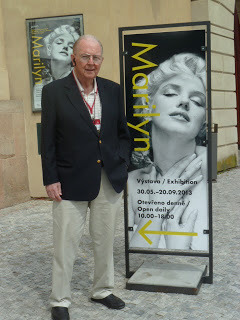 We embarked on a cruise on the Elbe River with Viking Cruises aboard the Clara Schumann. I was glad to see that Clara was the honored one. Most might think of her husband, Robert Schumann, the composer, but the fact is that Clara Wieck Schumann (1819-1896) was much more famous in her own day as a pianist, performer, composer and as a muse for both her husband and Johannes Brahms.
We embarked on a cruise on the Elbe River with Viking Cruises aboard the Clara Schumann. I was glad to see that Clara was the honored one. Most might think of her husband, Robert Schumann, the composer, but the fact is that Clara Wieck Schumann (1819-1896) was much more famous in her own day as a pianist, performer, composer and as a muse for both her husband and Johannes Brahms.
 MS Clara Schumann on the Elbe We were a little concerned in the weeks leading up to our cruise since there were serious floods on the Elbe, Danube, and elsewhere in Central Europe. Luckily the flood had ebbed by the time we started out, but we had to make a few minor adjustments along the way due to damage -- and we saw some evidence of it, though nothing like the horrendous tragedy of 2002.
MS Clara Schumann on the Elbe We were a little concerned in the weeks leading up to our cruise since there were serious floods on the Elbe, Danube, and elsewhere in Central Europe. Luckily the flood had ebbed by the time we started out, but we had to make a few minor adjustments along the way due to damage -- and we saw some evidence of it, though nothing like the horrendous tragedy of 2002.
 The Bohemian Mountains We were surprised at the majestic scenery of the area on the Czech-German border with its stone formations, once a must for visiting by people such as the English painter J.M.W. Turner and author Mary Shelley. We walked everywhere, if sometimes limping! After many interesting stops, about which I will write soon -- including Dresden, Meissen, etc., we left the ship and went to Potsdam and then Berlin. Dresden is remarkable. By now, the cobblestones were anything but quaint. Feet were aching. Required large infusions of wine.
The Bohemian Mountains We were surprised at the majestic scenery of the area on the Czech-German border with its stone formations, once a must for visiting by people such as the English painter J.M.W. Turner and author Mary Shelley. We walked everywhere, if sometimes limping! After many interesting stops, about which I will write soon -- including Dresden, Meissen, etc., we left the ship and went to Potsdam and then Berlin. Dresden is remarkable. By now, the cobblestones were anything but quaint. Feet were aching. Required large infusions of wine.
 Dresden Opera Berlin is amazing. A forest of cranes and derricks, construction everywhere, and almost every teenager in Europe on hand. Except the tens of thousands who were in London!
Dresden Opera Berlin is amazing. A forest of cranes and derricks, construction everywhere, and almost every teenager in Europe on hand. Except the tens of thousands who were in London!
 Ed stands at remains of the Wall, or a touristy replica -- opinions varied! Lots of walking in Berlin, through museums with very hard marble floors, more cobblestones, treks to see this and that, all wonderful but far apart. Feet suffering. Swollen. Shoes now too tight. Limping. After a few hectic days in crowded, lively Berlin, we flew to Heathrow.
Ed stands at remains of the Wall, or a touristy replica -- opinions varied! Lots of walking in Berlin, through museums with very hard marble floors, more cobblestones, treks to see this and that, all wonderful but far apart. Feet suffering. Swollen. Shoes now too tight. Limping. After a few hectic days in crowded, lively Berlin, we flew to Heathrow.
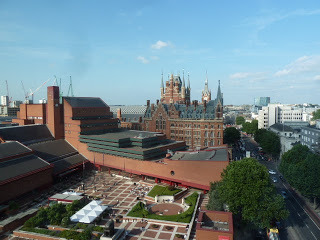 View from our Hotel in Euston Road We were at the London Pullman St. Pancras Hotel, just west of the British Library, with the St. Pancras Hotel/Station, recently refurbished in the background. We had two nights there, then went by train to Cambridge, then to Norfolk. Did I say we walked a lot? Uneven paving stones? Blisters?
View from our Hotel in Euston Road We were at the London Pullman St. Pancras Hotel, just west of the British Library, with the St. Pancras Hotel/Station, recently refurbished in the background. We had two nights there, then went by train to Cambridge, then to Norfolk. Did I say we walked a lot? Uneven paving stones? Blisters?
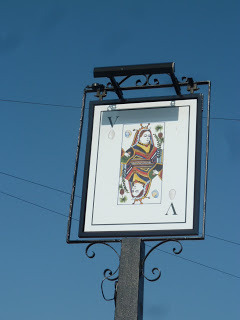 We stayed here, at the Victoria, in Holkham Village, while we visited two stately homes, Houghton Hall and Holkham Hall, about which I promise to report in considerable detail.
We stayed here, at the Victoria, in Holkham Village, while we visited two stately homes, Houghton Hall and Holkham Hall, about which I promise to report in considerable detail.
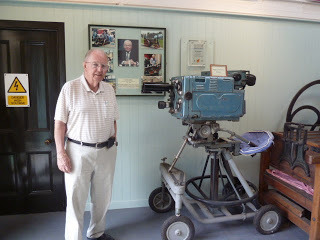 At the Bygones Museum, Holkham, Ed -- a former tv newsman -- admired an old television camera, not so long ago state-of-the-art, now a museum piece. We returned to London for a few days of more touring. By now, I felt like we had almost conquered Everest, both in distances hiked and elevations -- well, almost.
At the Bygones Museum, Holkham, Ed -- a former tv newsman -- admired an old television camera, not so long ago state-of-the-art, now a museum piece. We returned to London for a few days of more touring. By now, I felt like we had almost conquered Everest, both in distances hiked and elevations -- well, almost.
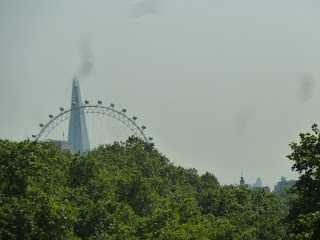
The view from the top of the Wellington Arch: The London Eye and the Shard. It was unusually warm (and very sunny) for our entire visit. The umbrellas, sweaters, jackets, and rain ponchos we packed were unworn. Could have taken more shoes. Note to self: Next time pack a pair at least one size larger for wearing after feet have already suffered.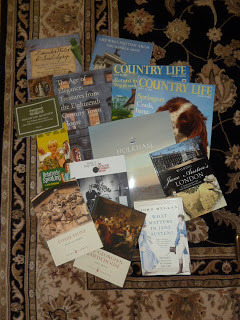 The Treasures I brought home! Along with lots of pics and many memories. I have many adventures to report, but I have to get over some jet lag and get Hubby back on his feet before I get too detailed! Kristine will finish her story before I start on mine! And how come that Royal Baby didn't arrive while I was there? Darn.
The Treasures I brought home! Along with lots of pics and many memories. I have many adventures to report, but I have to get over some jet lag and get Hubby back on his feet before I get too detailed! Kristine will finish her story before I start on mine! And how come that Royal Baby didn't arrive while I was there? Darn.
So, Victoria here, breathlessly just back from England (and the Czech Republic and Germany) with her very own long-suffering hubby. Here he is enjoying the treasures of the Fitzwilliam Museum in Cambridge.

We did not have anything like the trials and tribulations of Kristine and Greg last winter -- not even a moment of stomach upset. HOWEVER...our feet took a beating, and Ed was almost hobbling by the end of the three weeks-plus we were in Europe. Blisters.
I will report in detail later, after I've rested up, and Kristine has completed her saga. But in the meantime, here's a quick rundown of what Ed and I did on our summer holiday.
 Prague, Czech Republic We arrived in Prague, our first visit there, and spent a few days enjoying the beauties of that ancient city. Lots of walking, which is always the best way to see a city. Lots of hills, cobblestones and stairs. We were up to it. At first. Ed and I both enjoyed the unexpected display of photographs, shoes and gowns of Marilyn Monroe at the Prague Castle. She was honored as an icon of modern beauty, just as the many Venus portraits, nymphs and goddess were to those who decorated the Castle's many chambers several centuries ago. We also took in the usual tourist views, as well as a special luncheon and concert at the Lobkowicz Palace. Lots of walking. More cobblestones. Long hills.
Prague, Czech Republic We arrived in Prague, our first visit there, and spent a few days enjoying the beauties of that ancient city. Lots of walking, which is always the best way to see a city. Lots of hills, cobblestones and stairs. We were up to it. At first. Ed and I both enjoyed the unexpected display of photographs, shoes and gowns of Marilyn Monroe at the Prague Castle. She was honored as an icon of modern beauty, just as the many Venus portraits, nymphs and goddess were to those who decorated the Castle's many chambers several centuries ago. We also took in the usual tourist views, as well as a special luncheon and concert at the Lobkowicz Palace. Lots of walking. More cobblestones. Long hills.
 We embarked on a cruise on the Elbe River with Viking Cruises aboard the Clara Schumann. I was glad to see that Clara was the honored one. Most might think of her husband, Robert Schumann, the composer, but the fact is that Clara Wieck Schumann (1819-1896) was much more famous in her own day as a pianist, performer, composer and as a muse for both her husband and Johannes Brahms.
We embarked on a cruise on the Elbe River with Viking Cruises aboard the Clara Schumann. I was glad to see that Clara was the honored one. Most might think of her husband, Robert Schumann, the composer, but the fact is that Clara Wieck Schumann (1819-1896) was much more famous in her own day as a pianist, performer, composer and as a muse for both her husband and Johannes Brahms.
 MS Clara Schumann on the Elbe We were a little concerned in the weeks leading up to our cruise since there were serious floods on the Elbe, Danube, and elsewhere in Central Europe. Luckily the flood had ebbed by the time we started out, but we had to make a few minor adjustments along the way due to damage -- and we saw some evidence of it, though nothing like the horrendous tragedy of 2002.
MS Clara Schumann on the Elbe We were a little concerned in the weeks leading up to our cruise since there were serious floods on the Elbe, Danube, and elsewhere in Central Europe. Luckily the flood had ebbed by the time we started out, but we had to make a few minor adjustments along the way due to damage -- and we saw some evidence of it, though nothing like the horrendous tragedy of 2002.
 The Bohemian Mountains We were surprised at the majestic scenery of the area on the Czech-German border with its stone formations, once a must for visiting by people such as the English painter J.M.W. Turner and author Mary Shelley. We walked everywhere, if sometimes limping! After many interesting stops, about which I will write soon -- including Dresden, Meissen, etc., we left the ship and went to Potsdam and then Berlin. Dresden is remarkable. By now, the cobblestones were anything but quaint. Feet were aching. Required large infusions of wine.
The Bohemian Mountains We were surprised at the majestic scenery of the area on the Czech-German border with its stone formations, once a must for visiting by people such as the English painter J.M.W. Turner and author Mary Shelley. We walked everywhere, if sometimes limping! After many interesting stops, about which I will write soon -- including Dresden, Meissen, etc., we left the ship and went to Potsdam and then Berlin. Dresden is remarkable. By now, the cobblestones were anything but quaint. Feet were aching. Required large infusions of wine.
 Dresden Opera Berlin is amazing. A forest of cranes and derricks, construction everywhere, and almost every teenager in Europe on hand. Except the tens of thousands who were in London!
Dresden Opera Berlin is amazing. A forest of cranes and derricks, construction everywhere, and almost every teenager in Europe on hand. Except the tens of thousands who were in London!
 Ed stands at remains of the Wall, or a touristy replica -- opinions varied! Lots of walking in Berlin, through museums with very hard marble floors, more cobblestones, treks to see this and that, all wonderful but far apart. Feet suffering. Swollen. Shoes now too tight. Limping. After a few hectic days in crowded, lively Berlin, we flew to Heathrow.
Ed stands at remains of the Wall, or a touristy replica -- opinions varied! Lots of walking in Berlin, through museums with very hard marble floors, more cobblestones, treks to see this and that, all wonderful but far apart. Feet suffering. Swollen. Shoes now too tight. Limping. After a few hectic days in crowded, lively Berlin, we flew to Heathrow.
 View from our Hotel in Euston Road We were at the London Pullman St. Pancras Hotel, just west of the British Library, with the St. Pancras Hotel/Station, recently refurbished in the background. We had two nights there, then went by train to Cambridge, then to Norfolk. Did I say we walked a lot? Uneven paving stones? Blisters?
View from our Hotel in Euston Road We were at the London Pullman St. Pancras Hotel, just west of the British Library, with the St. Pancras Hotel/Station, recently refurbished in the background. We had two nights there, then went by train to Cambridge, then to Norfolk. Did I say we walked a lot? Uneven paving stones? Blisters?
 We stayed here, at the Victoria, in Holkham Village, while we visited two stately homes, Houghton Hall and Holkham Hall, about which I promise to report in considerable detail.
We stayed here, at the Victoria, in Holkham Village, while we visited two stately homes, Houghton Hall and Holkham Hall, about which I promise to report in considerable detail.
 At the Bygones Museum, Holkham, Ed -- a former tv newsman -- admired an old television camera, not so long ago state-of-the-art, now a museum piece. We returned to London for a few days of more touring. By now, I felt like we had almost conquered Everest, both in distances hiked and elevations -- well, almost.
At the Bygones Museum, Holkham, Ed -- a former tv newsman -- admired an old television camera, not so long ago state-of-the-art, now a museum piece. We returned to London for a few days of more touring. By now, I felt like we had almost conquered Everest, both in distances hiked and elevations -- well, almost.

The view from the top of the Wellington Arch: The London Eye and the Shard. It was unusually warm (and very sunny) for our entire visit. The umbrellas, sweaters, jackets, and rain ponchos we packed were unworn. Could have taken more shoes. Note to self: Next time pack a pair at least one size larger for wearing after feet have already suffered.
 The Treasures I brought home! Along with lots of pics and many memories. I have many adventures to report, but I have to get over some jet lag and get Hubby back on his feet before I get too detailed! Kristine will finish her story before I start on mine! And how come that Royal Baby didn't arrive while I was there? Darn.
The Treasures I brought home! Along with lots of pics and many memories. I have many adventures to report, but I have to get over some jet lag and get Hubby back on his feet before I get too detailed! Kristine will finish her story before I start on mine! And how come that Royal Baby didn't arrive while I was there? Darn.
Published on July 22, 2013 00:00
July 19, 2013
The Wellington Connection - Chad & Jeremy

You may recall that when Hubby and I were in London recently we did the Hop On, Hop Off bus tour, during which I learned that Jeremy Clyde, one half of the musical duo Chad and Jeremy, was related to the Duke of Wellington. This was news to me, so of course I had to do further research on the subject. It turns out that Jeremy's mother is Lady Elizabeth Clyde (b. 1918), the daughter of Gerald Wellesley, 7th Duke of Wellington, and Dorothy Violet Ashton, and is thus a great-great-granddaughter of Arthur Wellesley, 1st Duke of Wellington. Jeremy Clyde, born Michael Thomas Jeremy Clyde, is an actor as well as a musician and made his first public appearance as a pageboy to his grandfather, the Duke of Wellington, at the coronation of Queen Elizabeth II of the United Kingdom in 1953.
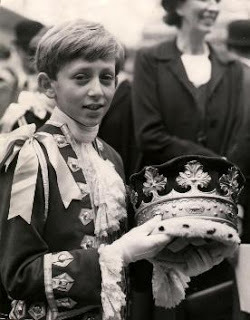
During the 1960s, he was one half of the folk duo Chad and Jeremy, who had little success in the UK but were an object of interest to American audiences. He has enjoyed a long television acting career, and continues to appear regularly on the tube, usually playing upper-middle class or aristocratic characters. Most recently, Jeremy appeared in Season 2, Episode 1 of Downton Abbey playing, coincidentally, a military general. Another coincidence, or not, is the uncanny resemblance Jeremy has to his ancestor, the first Duke of Wellington.
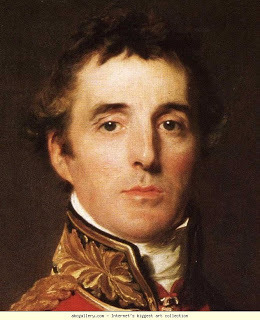


To learn more about Chad and Jeremy, the backstory of their partnership and what they're doing now, you can visit their website here.
Published on July 19, 2013 00:00
Kristine Hughes's Blog
- Kristine Hughes's profile
- 6 followers
Kristine Hughes isn't a Goodreads Author
(yet),
but they
do have a blog,
so here are some recent posts imported from
their feed.





